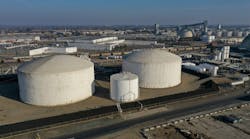With the price of diesel fuel, like gasoline, already escalating—jumping almost 10% between February and March and more than 37% year-over-year—the Canadian Trucking Alliance (CTA) is warning that come July 1st—the date the government proposes to mandate that on-road diesel sold in Canada must contain an average two per cent biofuel content—the pain felt at the pumps will only get worse.
Given that trucks, the largest buyers of diesel fuel, move 90% of all consumer products and foodstuffs, CTA warns this could also lead to higher prices to consumers for all goods.
Currently in the United States where there is a somewhat more mature biodiesel market, prices are, depending on the level of biofuel blended into the diesel, running at one to eight cents per liter above the price of regular diesel fuel. For Canadian truckers, this could mean annual increases in diesel fuel costs (the second-largest component of cost for trucking companies and the largest cost for small independent operators) in the range of $2,100-$6,000 per truck depending where biodiesel price increases fall in Canada.
According to CTA, a leading feedstock to be used in producing biodiesel (canola) is already at record highs despite record volumes, so the cost impact on Canadian truckers could be even greater. The government’s own Regulatory Impact Analysis Statement acknowledges that biodiesel will cost consumers more, but underestimates the impact according to CTA. CTA stated that vehicle maintenance costs in the early stages of the biodiesel regulation will also rise.
In addition, biodiesel is costly to produce and there is a severe shortage of biofuel production and blending capacity in Canada. It is widely acknowledged that Canada will have to import 85% of the biodiesel need to comply with the mandate. The Canadian Petroleum Products Institute recently called on the government to delay implementation of the biodiesel mandate until its members can build the necessary blending facilities required to satisfy the regulation.
According to its own Regulatory Impact Analysis Statement, the federal government says it has doled out more than $2 billion in subsidies to the renewable fuels industry in recent years. It also says there will be a net cost to taxpayers from the mandate of about $2.4 billion over the next 25 years with only an incremental reduction (a mere 1 MT CO2 per year) in GHG. “It really makes you wonder why we’re doing this,” said David Bradley, chief executive officer of the trucking alliance.
“All of these things add up to one thing—higher prices for consumers,” said Bradley. “The only question is by how much. The biodiesel mandate is only going to make things worse. They can’t even guarantee us that the stuff won’t gum up most truck engines at the kinds of blend rates we are likely to see at certain times of the year in various parts of the country. There is no protection for the consumer.
“The biofuel producers are getting literally everything they want—regulatory certainty, a captive market, and massive subsidies—all of which they can take to the bank,” he said,”whereas the consumer, mainly truckers, will get even higher fuel prices that we currently have at a time when trucking companies are just finding their financial legs after being ravaged by the recession. Why should truckers be forced to pay more when the biofuel industry has already received billions in subsidies? It’s no different than a fuel tax increase.”
Bradley insists CTA is not opposed to the introduction of alternative fuels into the trucking industry. “We have been consistent on this point; why wouldn’t we want to reduce our reliance on oil? But, we need to be sure the fuel we put in our tanks works, it has to be in plentiful supply and it should not cost us more than regular diesel.”








